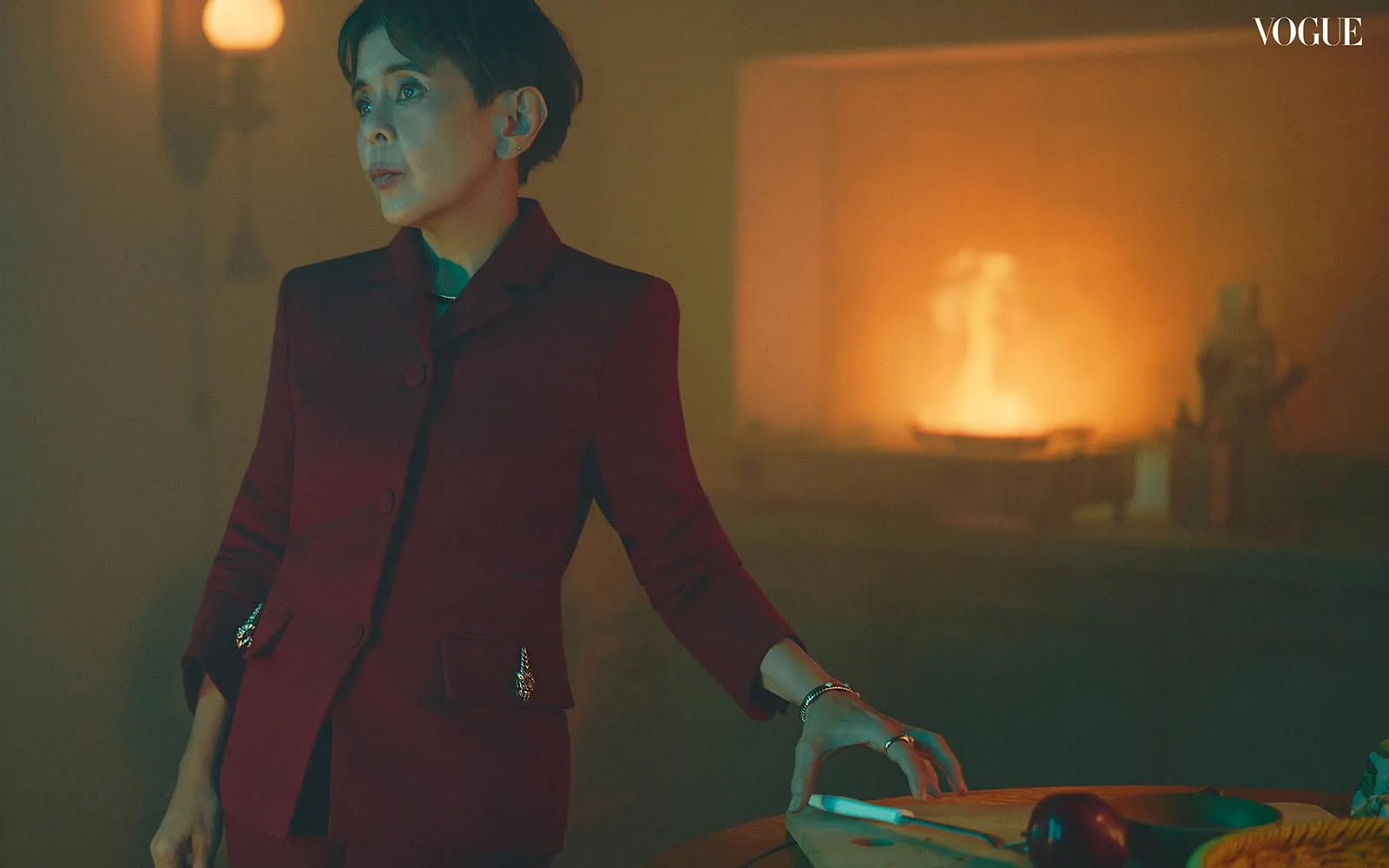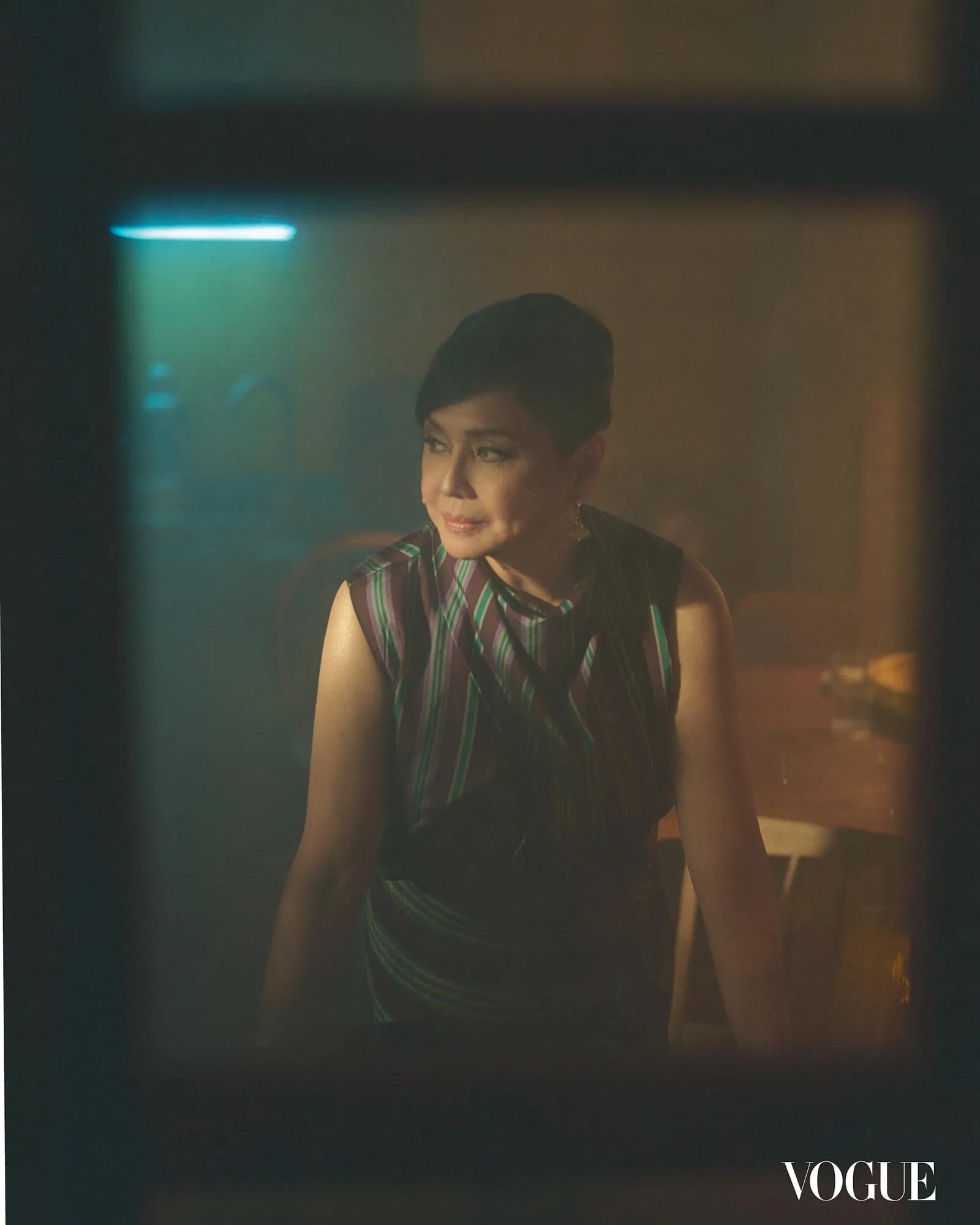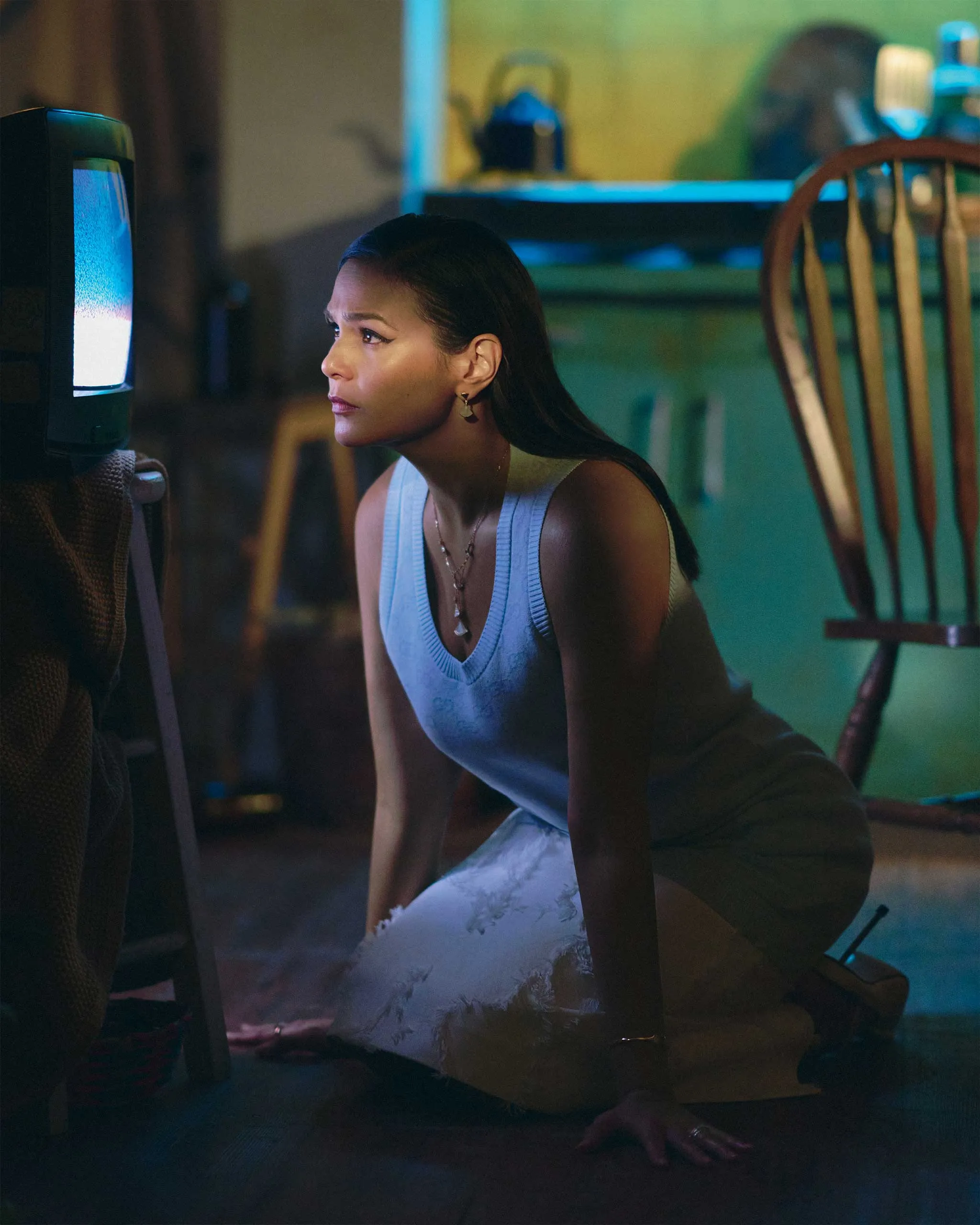Iza Calzado wears a GUCCI top and skirt, JACQUEMUS shoes, and BULGARI earrings, necklace, bracelet, and rings. Photographed by BJ Pascual for the September 2025 Issue of Vogue Philippines
Five years after its founding, the League of Filipino Actors finds its brightest stars taking on their most enduring and meaningful role yet: as organizers for their own community.
When the pandemic shut down the Philippine film industry, two decades of hard-earned momentum vanished overnight. With projects on pause and no clear end in sight, 26 actors gathered on a call to talk about the future. Conversations once kept private, about 24-hour shoots, workplace malpractices, pay inequities, and the lack of protection for freelancers, were finally out in the open. One Zoom call turned into two, then four-hour meetings. Dozens became hundreds. By May 2020, the group launched as AKTOR, the League of Filipino Actors.
The speed was not planned, but the idea of uniting had been there for decades, catalyzed by the unexpected death of Eddie Garcia on set in June 2019. “It wasn’t formal at first. We didn’t even know we were starting a guild,” says Dingdong Dantes, AKTOR’s chairman. “But the desire to come together, to help, and to organize came naturally. Out of that moment of crisis, something meaningful took root… And while we were all in different locations, what brought us together was the same concern: What’s going to happen to us? What will happen to the people we work with?”
The group began with pragmatic action: town halls on COVID-era protocols, vaccine availability, and online marketplaces supporting actors’ home-based businesses. As the industry reopened, organizing around rights and welfare became increasingly complex.
For Charo Santos-Concio, former CEO of ABS-CBN Corporation and now a trustee of AKTOR, empowering actors begins with education and talent development. Though she emerged as a force during the Second Golden Age of Philippine cinema, she wasn’t backed by a major manager. Only big studios like Sampaguita Pictures, Lea Productions, and Tagalog Ilang-Ilang invested in actors’ welfare. “When I was starting, there were no workshops or training programs. Resources were very limited,” she says. “We would wait under a shed or be given a corner at a location. We didn’t have glam teams and stylists. Studios might provide basics, but actors were expected to bring their own wardrobe.”
Iza Calzado, AKTOR’s president, agrees that education is key to empowerment. Under AKTOR Eskwela, they’ve hosted masterclasses with Pinky Amador, Angeli Bayani, Marlon Rivera, and Ricci Chan.

Beyond education, AKTOR levels the playing field by offering benefits that might be only enjoyed by actors with management. Jasmine Curtis-Smith, youth and secretariat of the executive board, says that these services such as accounting assistance, tax education, and even referrals to psychological services help actors who are just starting out in the industry or who are just beginning to freelance. “There’s so much money in our industry, but not everyone has projects daily or a company to rely on financially. I was excited because it was an opportunity for us to figure something out in an uncertain time.”
A key initiative is the ACT-OR Helpdesk, where actors can request help for legal matters, labor concerns, or mental health issues. “It’s hard to convey your needs without being seen as demanding,” says Curtis-Smith. The helpdesk becomes a way to discuss stipulated pay or meeting correct deadlines.” While not a union like the SAG-AFTRA, AKTOR’s partnership with the Inter-Guild Alliance (IGA) allows it to relay labor violations to DOLE discreetly. “We’re used to pakiusap and pakikisama. But this is a profession. We want people to feel like they’re not left up in the air. We’re hoping that the helpdesk would help eliminate these workplace violations.”
Ruru Madrid, who started as a child actor, sees these collective efforts as vital to protecting the safety of the newer fleet of talent entering the industry. “Before, it was always a competition. But now, it’s about helping one another,” he says. Madrid sees its growth as part of a shift to developing caring systems within the film industry, away from the powerplays that poison it. “We aren’t just helping our co-actors, but also other workers within the industry. And it has to come from the actors because we are the ones who face the audience and are, sometimes, the few people with the capacity to voice things out.”
Aside from its member-focused programs, AKTOR has also launched external initiatives to help legitimize acting to the public; such as a podcast where actors themselves unpack the craft and share industry insight. For Agot Isidro, AKTOR’s vice chair, this transparency is essential. “When people think of actors, they think it’s just glamour. But it’s hard work, filled with compromises. The job is more difficult than it seems,” she says. “People used to want mystery. But now with social media, they want actors closer to them, [in case] they might have the same skin cream.”
“When I was starting, there were no workshops or training programs. Resources were very limited.”
—CHARO SANTOS-CONCIO
Presenting a united front is a priority. For Dantes, that meant addressing inequities of opportunity. “One of the first problems we tried to solve was access; access to information, to visibility, to credibility. So many brilliant actors were overlooked because they didn’t have the right platform or connections. So we built our own.”
In May 2025, they launched a Philippine-exclusive actor database, a localized version of IMDb featuring members’ projects, awards, and reels. “We had to gather accurate data from members, build something that was both scalable and secure, and educate people on why this matters. There was also the cultural shift; it took some convincing to show that this wasn’t just a tech gimmick,” says Dantes. “We’re not just creating a database; but a mindset of ownership, transparency, and readiness for global opportunity.”
Behind the scenes, organizing was daunting. “I never thought we’d have to create bylaws. I thought those things just happened,” says Mylene Dizon, treasurer of AKTOR. “We’d stay up till 4 AM. Even now, it’s still a work-in-progress. It’s difficult because we’re an organization that…[is] for the betterment of the industry. As much as you want your bylaws to be encompassing, you have to set limits otherwise you’d be abused.
Money and sustainability remains a challenge. “I didn’t realize that I could fight off so many suggestions because we didn’t have a budget,” Dizon admits. Membership fees help, but don’t cover the full cost of workshops, awards, or daily operations. “What outsiders may not see is that we are all volunteers. There’s no full-time secretariat running AKTOR,” says Dantes. “That means burnout is real and sustainability becomes a key concern. And yet, we stay committed, because the work is important.”
Still, partnerships have grown. From Mowelfund, the Film Academy of the Philippines, and the Film Development Council of the Philippines, to Caltex for fuel discounts, MindNation for mental health services, Liberty Insurance for HMO plans, and even Booky for discounted meals, the support has come from both within and beyond the industry.
But mass membership is the goal. “Every Filipino actor needs to become a member,” Dizon says. “More than the budget, it assures you that you’ve gained 100 percent of the industry’s trust. That gives you more pull than anything.” Yet recruitment remains difficult, due to fear of management conflicts or being labeled as “anti-producer.” “There’s this stigma that we’re activists or that we’re against producers,” Dizon adds. “But we’re doing this for everybody and for everything that actors complain about anyway.”
AKTOR remains “issue-based and non-partisan.” It welcomes actors of all backgrounds but does not shy away from tough topics. It defended Liza Soberano, Angel Locsin, and Catriona Gray after they were red-tagged, organized relief for Typhoon Ulysses, and opposed Senate Bill 2805, which sought to expand MTRCB’s jurisdiction to digital platforms.
Policy representation remains one of its top priorities and one of its landmark victories is the Eddie Garcia Law (EGL), which “safeguards the rights and wellbeing of workers in the film and television industry.” “If not for AKTOR, the EGL would’ve sat on its ass for the longest time without anything happening,” says Dolly De Leon, who joined the group during its third wave of recruitment. “How can people be creative when they’re tired? It’s only here in the Philippines where you’ll see the crew sleeping while you’re doing a take.”
De Leon joined Calzado at a Senate labor commitee hearing in 2023 to push for the approval of EGL despite being daunted in the face of producers. “You have to consider [that] they’re thinking of the bottom line, which makes sense. But I had to set that aside and focus on improving the system in the industry. It’s for everyone’s good. If your actors are protected, if they’re working in a safe and healthy space, they can deliver better, more creative work. It’s a symbiotic relationship.”
At the hearing, they recounted 23-hour shoot days and pushed for reasonable hours and longer turnarounds; hoping to prevent tragedies like Garcia’s. “My hope was that they thought about it like that too, which they fortunately did. [It] allowed us to reach a compromise,” says De Leon. “If we’re just going to keep thinking about ourselves, about what people are going to think, our reputation, then nothing’s going to improve. What about everybody else? You have to think about everybody else.”
“If your actors are protected, if they’re working in a safe and healthy space, they can deliver better, more creative work. It’s a symbiotic relationship.”
—DOLLY DE LEON
“We do this so we have a seat at the table for discussion,” says Calzado. “The fact that I saw this after 20 years of being in the industry? It’s quite new. And the great thing about it is that everybody knows that it exists. It’s not just one or two artistas who have a 2 AM cut-off. We can say that everybody has a cut-off. That matters.” When the bill passed in February 2024, Calzado, Dantes, and others were present to celebrate.
Today, AKTOR is focused on securing the future. Piolo Pascual, the group’s public affairs director, joined early on through Calzado. “You get to a point in your life where you have to consider your colleagues. As much as you’re given good work and projects, you are part of a team. You have to look out for them,” says Pascual. “Who else will do it? Might as well do it while we have the time and while we’re here together as contemporaries.”
Like Dantes, Pascual dreams of expanding Filipino reach beyond the diaspora. “I want us to push for globalization. If we come together and produce something we believe in, we can champion our content to a bigger market, which is world cinema. That’s always been at the back of my head. We have what it takes.”
For Cherry Pie Picache, AKTOR’s welfare director, the future lies in securing residuals and royalties. “That’s what I’m really advocating for,” she says. “It’s time all stakeholders—directors, writers, everyone—receive remuneration and royalty fees because our soaps are viewed abroad.”

Picache believes this can happen in our lifetime, but only if we work on it now. In August 2022, the Supreme Court ruled in favor of the Filipino Society of Composers, Authors, and Publishers (FILSCAP), granting its members the right to collect royalties for their work and sue for copyright infringement after more than a decade of lobbying. Picache says this will benefit all film workers, but most of all the senior actors and those who are sick and disabled. “Then, even if you’re not acting anymore, you can get something out of the work that you’ve done in the past years. Even if it’s just for groceries or for electricity.”
Five years in, organizing post-pandemic has only grown more complicated. Now, aligning schedules around shooting dates, creative responsibilities, and even parental obligations has emerged as the largest logistical challenge. But Dantes insists that AKTOR has adapted. “We shifted to smaller, more agile teams. We hold hybrid meetings. We embrace digital tools. But what hasn’t changed is the spirit: the same sense of urgency and unity that started in 2020 is still there. We’re just finding more efficient, realistic ways to keep that fire burning while also honoring the demands of real life.”
Calzado remains hopeful. With an engaged executive committee, including Joel Saracho, Jenny Jamora, Marlon Rivera, Andoy Ranay, Ron Capinding, Ge Villamil, and Ricci Chan, she sees a stronger future. “We have the ideas. With the right partners, funding, and support, we can give back to the community,” she says. “We hope people understand we are not doing this for personal gain. We really need to be united and know that we are doing this for all of us. We won’t stop here. We’ll keep learning and doing better. As we must. As we should.”
See more of this story in the Anniversary Issue of Vogue Philippines, available at the link below.
By JASON TAN LIWAG. Photographs by BJ PASCUAL. Editors PAM QUIÑONES, DANYL GENECIRAN, JOYCE OREÑA, and DAVID MILAN. Styling by NEIL DE GUZMAN and RENÉE DE GUZMAN. Talents: Agot Isidro, Piolo Pascual, Iza Calzado, Mylene Dizon, Jasmine Curtis Smith, Charo Santos, Dingdong Dantes, Cherry Pie Picache, Dolly De Leon, and Ruru Madrid. Managing Editor: Jacs Sampayan. Art Director: Jann Pascua. Media Channels Editor: Anz Hizon. Producer: Julian Rodriguez. Associate Digital Editor: Chelsea Sarabia. Vogue Man Writer: Gabriel Yap. Digital Content Writer: Daphne Sagun. Digital Fashion Writer: Lawrence Alba. Media Channels Copywriter: Aylli Cortez. Media Channels Producer: Angelo Tantuico. Multimedia Artist: Mcaine Carlos. Photography Team: Damian Estrellis, Richard Detita, Jilmer Carlos, John Paul Dela Cruz, and Abel Santos. Director and Editor: Al Amin. Director of Photography: Dino Placino. Consulting Director: JA Tadena. Camera Operator: Tim dela Paz. 1st AC/Camera Operator: Nathan Gumba. Gaffer: Gilbert Daclan. Makeup: Lala Flores (Agot, Iza, and Mylene), Donald Magbojos (Piolo), Pam Robes (Jasmine and Dolly), Juan Sarte (Charo and Dingdong), and Don De Jesus (Cherry Pie and Ruru). Hair: Barceliza Gimeno, Melen Guiritan, and Rhian Palmes of J/Monis Salon (Jasmine, Dolly, Agot, Iza, Mylene, Cherry Pie, and Ruru), Jonathan Velasco (Charo), Nelson Cruz (Dingdong), and Donald Magbojos (Piolo). Production Designer: Justine Arcega.
Shot on location at Parallax Studio. Special thanks to Kazu Cafe.
- Four Pioneers of Philippine Fashion Image-Making Look Back on an Era They Helped Define
- Over 200 Filipino Creatives, Spread Across Decades of Behind-the-Scenes Work, Unite to Share the Frame
- Lady of the Hour: Cinematic Stills Reimagined in Filipino Grace
- After Years of Capturing the World Outside Her, Hannah Reyes Morales Turns Her Gaze Inward

